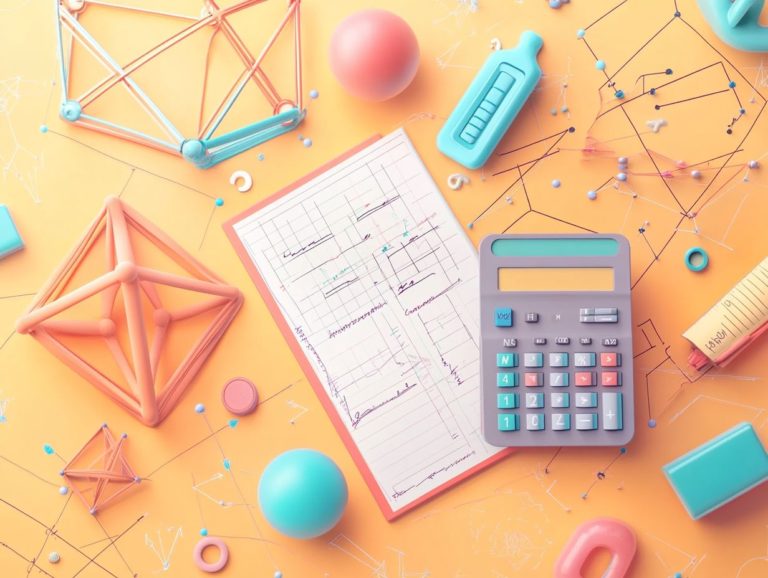best study techniques for ap tests
As the Advanced Placement (AP) exams draw near, you might feel the weight of the pressure to excel. Grasping effective study techniques can truly transform your performance and lead to those coveted high scores.
This article explores AP tests. It emphasizes the benefits of customized study strategies tailored to your learning style and offers practical tips to improve retention.
From engaging in active learning methods to mentally preparing for the big day, you ll discover the essential tools needed for your success.
Contents
- Key Takeaways:
- Benefits of Effective Study Techniques
- Identifying Your Learning Style
- Best Study Techniques for AP Tests
- Tips for Retaining Information
- Preparing for Test Day
- Frequently Asked Questions
- What are the best study techniques for AP tests?
- How can I create an effective study schedule for AP tests?
- Why is engaging with the material important for AP test preparation?
- How can practicing with past exams help me prepare for AP tests?
- Are flashcards or other study aids helpful for AP test preparation?
- Should I seek help from tutors or teachers when preparing for AP tests?
Key Takeaways:

Engage actively with the material! Techniques like note-taking and summarizing can dramatically boost your AP test scores. Identifying your learning style and utilizing corresponding study techniques enhances understanding and retention. Additionally, incorporating the best techniques for essay-test preparation is essential. Effective time management is also crucial, along with practice tests and memory techniques, all contributing to a successful AP test preparation plan.
What are AP Tests?
AP tests, or Advanced Placement exams, are standardized assessments created by the College Board. They grant high school students the opportunity to earn college credit or advanced placement in college courses.
These exams include a variety of subjects, such as:
- Calculus AB
- US History
- Biology
- Computer Science Principles
By successfully passing these AP exams, you can demonstrate your readiness for college-level coursework. This enhances your academic profile and opens doors to substantial tuition savings.
Each exam assesses your knowledge through a blend of multiple-choice questions and free-response sections. This requires both critical thinking analyzing information to make reasoned conclusions and effective communication skills.
Therefore, developing targeted exam preparation strategies is essential for achieving success in AP. Learning how to customize your study approach for tests can significantly boost your performance, maximizing your high school experience while laying a solid foundation for future academic and professional pursuits.
Benefits of Effective Study Techniques
Effective study techniques are essential for high school students preparing for AP exams. To maximize retention and elevate your performance on test day, consider exploring the best study techniques for test prep.
By embracing a range of study strategies, you can manage your time more effectively. This alleviates exam anxiety and cultivates a sense of accountability in your study schedule.
Utilizing resources like flashcards and engaging in group study sessions deepens your understanding of the material. Ultimately, this paves the way for your success in AP exams.
How Proper Study Techniques Can Improve AP Test Scores
Implementing effective study techniques can significantly boost your AP test scores. Consider exploring key strategies for the AP Psychology test and create a structured study plan tailored to your unique learning style.
By customizing your review materials whether through active learning strategies or practice tests you’ll solidify your understanding and prepare yourself for exam conditions. Leveraging resources like Khan Academy can further reinforce challenging content areas.
Involving regular practice problems allows you to track your progress, building confidence as you tackle exam questions. Establish a routine that includes a variety of review techniques, such as summarizing key concepts or engaging in group study sessions to enhance retention of critical information.
When you actively engage with the material through diverse methods, you improve your test readiness and develop a more analytical approach to problem-solving. Ultimately, a comprehensive study strategy paves the way for greater academic success and a deeper understanding of the subject matter.
Identifying Your Learning Style
Identifying your learning style is a crucial first step in crafting a study plan that caters to your needs. It significantly influences your success as a student, particularly when preparing for AP exams.
By understanding whether you are a visual, auditory, or kinesthetic learner, you can select the most effective study resources that enhance your retention of key concepts. This ultimately leads to more effective test preparation.
Tailoring your approach not only helps alleviate exam anxiety but also ensures that you are fully prepared and confident on exam day.
Understanding How You Learn Best

Understanding how you learn best is crucial for crafting effective review sessions that boost your study efficiency and retention. Tailor your approach now to unlock your full learning potential by recognizing whether you thrive in study groups or prefer solo study.
If you’re a visual learner, diagrams, color-coded notes, and videos work wonders. For auditory learners, engaging in discussions and listening to lectures could be your ticket to success. Kinesthetic learners, who favor hands-on experiences, benefit from simulations or physical activities that reinforce concepts.
These diverse learning styles shape your study habits. Personalizing your techniques enhances comprehension and makes the process more enjoyable. Embrace these individual differences for a more effective study experience that fosters understanding and promotes long-term retention.
Best Study Techniques for AP Tests
The most effective study techniques for AP tests require a thoughtful blend of structured planning, active learning, and consistent practice. For additional strategies, check out the best study techniques for college exams. This ensures you are thoroughly prepared across all content areas.
Craft a comprehensive review schedule that includes study methods like spaced repetition and practice tests. These strategies can significantly boost your retention and build your confidence.
Tap into resources such as Khan Academy and The Princeton Review for invaluable materials and strategies designed to simplify complex topics and enhance your exam skills.
Active Learning Strategies
Active learning strategies, such as group study and tackling practice problems, deepen your understanding and enhance retention for AP exams. Utilizing effective techniques for practice test review fosters collaboration and discussion among peers, creating a supportive environment.
Engaging your peers in interactive study sessions boosts memory retention and helps you acquire essential exam strategies to ease any anxiety you might feel.
Incorporate techniques like flashcards, peer-teaching, and concept mapping to actively engage with the material, making it accessible and memorable.
For example, forming study groups enables you to explain concepts to one another, reinforcing your understanding while identifying gaps in your knowledge. Regularly schedule practice tests under timed conditions to simulate exam pressures, providing valuable insights into pacing and areas for improvement.
This comprehensive approach prepares you academically and builds confidence, which is crucial for success in high-stakes testing scenarios.
Effective Time Management
Effective time management is essential for crafting a successful study plan. Allocate ample time for content review and practice while keeping track of your progress.
Implement smart scheduling strategies like setting specific goals and deadlines to maintain accountability and ensure thorough coverage of every content area before exam day.
Balance your study sessions with rest periods to alleviate tension and enhance overall performance.
To elevate your preparation, consider using the Pomodoro Technique, which involves studying intensely for 25 minutes, followed by a 5-minute break. This promotes sustained concentration.
Create a visual progress chart as a motivational tool to visualize your accomplishments and what still needs to be done.
A consistent review schedule deepens your understanding of the material, fostering confidence as exam day approaches. Engaging with peers in study groups also provides diverse insights, keeping the learning process dynamic and accountable.
Start implementing these techniques now to prepare effectively for your upcoming tests!
Utilizing Practice Tests and Review Materials
Practice tests and review materials are vital for understanding the exam format. They help you get familiar with the types of questions you’ll face while allowing you to check your grasp of the content.
Incorporate practice problems and timed sessions into your study routine. This builds confidence and sharpens your exam strategies.
As you tackle various formats, you’ll learn to manage your time and answer questions more efficiently. Review materials deepen your knowledge and teach effective test-taking techniques, like eliminating wrong answers.
Use these tools wisely in the weeks before the exam. They can significantly boost your performance and make your preparation both efficient and effective.
Tips for Retaining Information

To retain information effectively, use specific memory tricks. Strategies like spaced repetition and mnemonic devices can help you organize your thoughts and improve your understanding.
Using different review techniques, such as flashcards and practice problems, makes studying more interactive and enjoyable. This keeps your study sessions productive and fun.
Memory Techniques and Strategies
Memory techniques are crucial for studying effectively. They help you turn large amounts of information into manageable pieces, making it easier to understand.
For example, visualization lets you create mental images that connect concepts to vivid scenes. Mnemonic devices are memory aids, like rhymes, that help you remember complex terms easily.
Combining these strategies creates an engaging study experience. This not only boosts your memory but also gives you ownership over the material, leading to better exam performance.
Preparing for Test Day
Preparing for test day means getting mentally and physically ready. Develop a calming routine that includes positive self-talk and tension relief to ease anxiety.
Get a good night s sleep and have a nutritious breakfast to enhance your mental sharpness and stamina. This lays a solid foundation for your success on exam day.
Mental and Physical Preparation
Effective preparation requires a holistic approach. Engage in positive self-talk and relaxation techniques to reduce exam anxiety.
Combine this with physical preparation, like a nutritious diet and hydration, to improve focus. Regular exercise, such as jogging or yoga, boosts both fitness and mental clarity.
Create a structured study schedule to feel more in control and less overwhelmed. Balancing mental strategies with physical care helps you prepare academically and build resilience for the challenges of AP exams.
Frequently Asked Questions
What are the best study techniques for AP tests?

Want to ace your AP tests? Discover the best study techniques that can boost your performance!
Create a study schedule, engage with the material, practice with past exams, use flashcards, and seek help from tutors or teachers.
How can I create an effective study schedule for AP tests?
Start by setting specific goals for each study session. Allocate enough time for each subject and mix them up to avoid burnout.
Include breaks for rest and relaxation in your schedule.
Why is engaging with the material important for AP test preparation?
Getting involved with what you re studying helps with understanding and retaining information. Take notes, summarize key points, and discuss the material with classmates.
How can practicing with past exams help me prepare for AP tests?
Practicing with past exams helps you get familiar with the test format and types of questions. It also improves your time management skills and helps you find areas to focus on.
Are flashcards or other study aids helpful for AP test preparation?
Yes, flashcards and study aids are great for memorizing key concepts and terms. They allow for quick reviews, making them valuable for your AP test prep.
Should I seek help from tutors or teachers when preparing for AP tests?
Seeking help from tutors or teachers gives you extra support and guidance. They clarify confusing concepts and provide personalized tips for success.





